Puppy or adult, that is the question. The primary advantage of acquiring an adult dog is that it usually arrives house trained. You also know its final size and personality. Although it may have a delightful temperament with you, there is the possibility that it has hidden behavioral problems such as a dislike of children. If you plan to get an adult dog, carry out these simple tests to learn more about its personality. Watch the dog's behaviour as you approach it; put it on a leash and take it for a walk among people. A park is a great place to do this test. Walk it past a dog and a child it has not met. Another good test is to open an umbrella in its presence to see if it is easily frightened. A skittish dog could possibly bite out of fear, known as a "fear biter." Another test is to tell your dog to sit. Leave it alone with a toy for approximately 10 minutes. This is a reward test to see how your dog reacts to being given a toy for doing something you asked of it. This will let you know if a toy is a good reward, or if you need to try a treat, such as a doggie biscuit, or my dog Chance's favorite, Biljac soft treats. These treats are made of pure chicken liver. Chance would jump off a building for a Biljac. These simple tests will help you make a rough evaluation of its temperament and anticipate any potential problems that might arise.
Puppies are still at the impressionable early-learning stage of life, but even eight-week-old pups of the same litter each have their own distinct personalities. The shyest individuals cling to their mother or cringe in corners, while the boldest march confidently forward to inspect you. These are the extremes of temperament within the litter. Choose accordingly to what you want from a dog.
Male or Female? Even in pre-pubertal puppies, there are sex differences in behavior. Male puppies have "masculinized" brains, affecting the surge of testosterone just before birth. Females remain behaviorally neutral until puberty. There are distinct differences in behavior in both sexes. Males are more likely to try to be dominate over their owners, act aggressively with other dogs, defend their territories, and be generally more active. To a lesser extent, they are more playful, more destructive, and likely to be snappy with children. The females are easier to obedience train and house train. They also demand more affection. There is no difference between the sexes in excitability, nervous barking, or defensive barking. Male dogs are more likely to urine mark territory and to wander. Females have 2 heat cycles twice a year that involve blood-tinged discharges that last about a week. Remember, a female is in heat for a total of 21 days. It takes 1 week for her to come in, the second week, she is in her full cycle, last week, she is going out of her cycle.
Just because the discharge has stopped, doesn't mean she is out of her cycle. And, of course, spaying and neutering your dog will reduce of eliminate many of these behavioural differences.
Kallee and Tamara

A Beautiful Summer Day.
Madam Kallee, CTD, CGC - 1994-2005 - Certified Therapy Dog and a Canine Good Citizen

I am so pretty!
Kallee, T.D.I., CGC - Certified Therapy Dog and a Canine Good Citizen - 1994-2005

I loved to pose for the camera.
Hat Girl.

The things I do for my mom!
Happiness.

Bubby knows how to scratch a tummy.
Best of Friends.

Mine! No, Mine!, No Mine!!!
Whew !

Bubby wears me out!
This is the Life.

Just relaxing with bubby.
Kallee and Mr. Monkey

See Mr. Monkey? Wanna play?
Miss Cool.

I loved to wear my shades.
Wednesday, April 11, 2007
Subscribe to:
Post Comments (Atom)













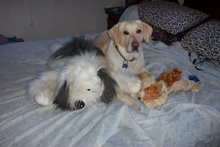






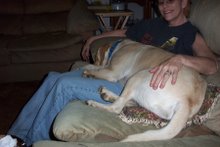





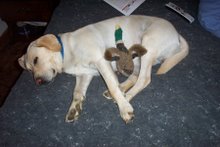

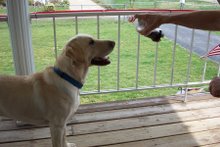


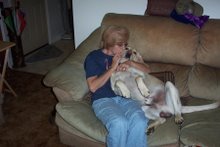
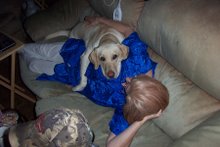

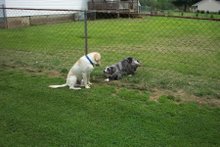




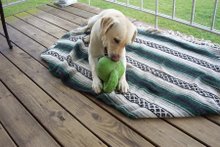
















No comments:
Post a Comment